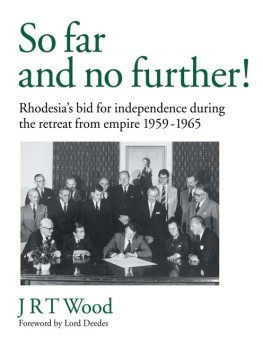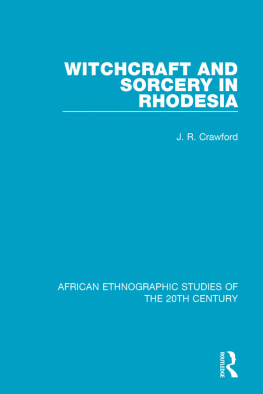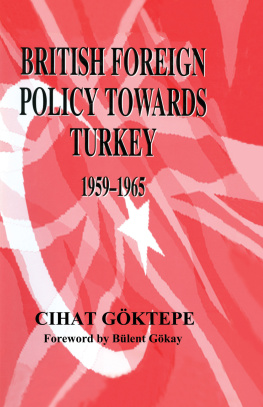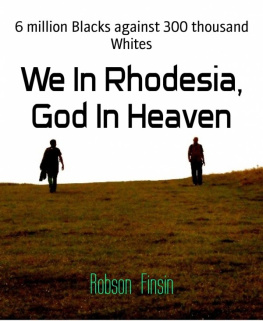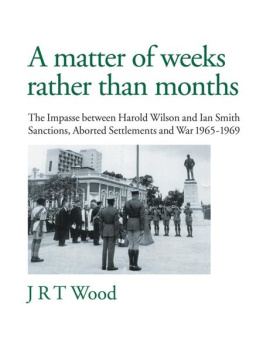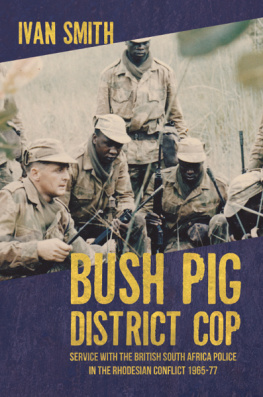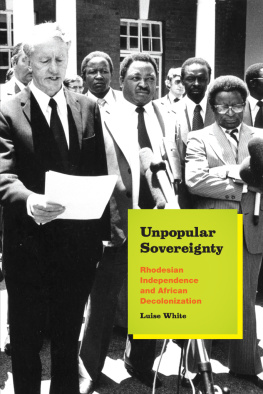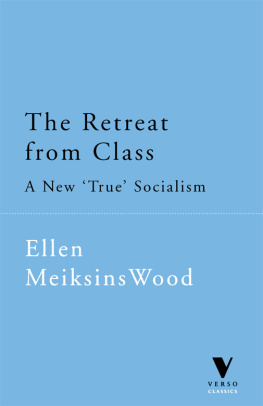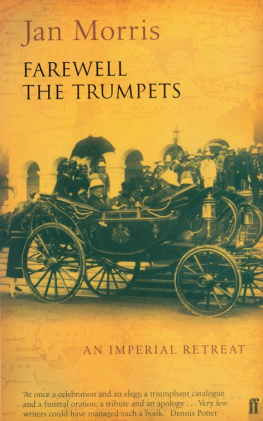J.R.T. Wood - So Far and No Further!: Rhodesia’s Bid for Independence During the Retreat from Empire 1959-1965
Here you can read online J.R.T. Wood - So Far and No Further!: Rhodesia’s Bid for Independence During the Retreat from Empire 1959-1965 full text of the book (entire story) in english for free. Download pdf and epub, get meaning, cover and reviews about this ebook. year: 2012, publisher: Trafford Publishing eBooks, genre: Politics. Description of the work, (preface) as well as reviews are available. Best literature library LitArk.com created for fans of good reading and offers a wide selection of genres:
Romance novel
Science fiction
Adventure
Detective
Science
History
Home and family
Prose
Art
Politics
Computer
Non-fiction
Religion
Business
Children
Humor
Choose a favorite category and find really read worthwhile books. Enjoy immersion in the world of imagination, feel the emotions of the characters or learn something new for yourself, make an fascinating discovery.
So Far and No Further!: Rhodesia’s Bid for Independence During the Retreat from Empire 1959-1965: summary, description and annotation
We offer to read an annotation, description, summary or preface (depends on what the author of the book "So Far and No Further!: Rhodesia’s Bid for Independence During the Retreat from Empire 1959-1965" wrote himself). If you haven't found the necessary information about the book — write in the comments, we will try to find it.
J.R.T. Wood: author's other books
Who wrote So Far and No Further!: Rhodesia’s Bid for Independence During the Retreat from Empire 1959-1965? Find out the surname, the name of the author of the book and a list of all author's works by series.
So Far and No Further!: Rhodesia’s Bid for Independence During the Retreat from Empire 1959-1965 — read online for free the complete book (whole text) full work
Below is the text of the book, divided by pages. System saving the place of the last page read, allows you to conveniently read the book "So Far and No Further!: Rhodesia’s Bid for Independence During the Retreat from Empire 1959-1965" online for free, without having to search again every time where you left off. Put a bookmark, and you can go to the page where you finished reading at any time.
Font size:
Interval:
Bookmark:
So Far
and No Further!
Rhodesias Bid for Independence during the Retreat from Empire 1959-1965
J.RTWood
Order this book online at www.trafford.com
o r email orders@trafford.com
Most Trafford titles are also available at major online book retailers.
Copyright 2012 J.R.T.Wood.
All rights reserved. No part of this publication may be reproduced, stored in a retrieval system, or transmitted, in any form or by any means, electronic, mechanical, photocopying, recording, or otherwise, without the written prior permission of the author.
Printed in the United States of America.
ISBN: 978-1-4669-3408-5 (sc)
ISBN: 978-1-4669-3407-8 (e)
Trafford rev. 04/26/2012
 www. traffo rd.com
www. traffo rd.com
North America & international
t oll-free: 1 888 232 4444 (USA & Canada)
phone: 250 383 6864 fax: 812 355 4082
CONTENTS
To
AMP
CAW & ATW
MR
PMB & TJB
CJSW & EMGW
CDM & JPM
All of whom inspired and helped me selflessly in the long years of research and writing
And earned my gratitude
I would contend that a countrys political history is the foundation of everything else. Once it is recorded, other aspects can be put in perspective. No one would write of Britain in the last days of the 20th Century without acknowledging the rise of New Labour and the consequences of their policies. The root of those policies lie in the Cabinet Room at No 10 Downing Street. The policies have first to be explained by research into the Cabinet Papers. Hitherto, however, Rhodesia, now Zimbabwe, has been ill-served by her historians. For reasons of the geographical difficulty of being far from their sources, but equally because of personal political distaste and the academic fashion of the time, they chose to study everything but the Government of the day. This is not to say that what they wrote is unimportant. It is important, but it has never been explored to its roots. So policies were written about and often derided but little effort was made to discover anything about their founding or their founders. African figures have attracted some attention but a great deal is left to be done. It is a curious phenomenon that a great deal is known about Rhodesias opposition figures but virtually nothing about those who made Rhodesia whatever she was. The estimable ideas of the liberals, now so cruelly discarded, have found their chroniclers but there is almost nothing written on the men and women who ruled Rhodesia. Where does one look for histories of the Governments of Huggins, Todd, Whitehead, Field and Smith or even biographies of them? Writers denounced the tough security laws of the early 1960s brought in by otherwise liberal men like Sir Edgar Whitehead and Reginald Knight without examining precisely what had motivated them to do this. The economy has been studied without reference to the policy-making in the Cabinet Room in Milton Building. What has been written in the political field is about the politics of the opposition and not of the governing parties. Even when looking at earlier less controversial times, it has been the fashion to write about the tiny Southern Rhodesian Labour Party but not to sully ones fingers with the deeds of Godfrey Martin Huggins and his United Party in power for 17 years. There is no basic work on events apart from a sparse effort by the late Lewis Gann. There is no overarching fundamental history covering the governing of Rhodesia from 1890 to 1980 and I believe there probably will never be. For that is the moment we live in. Whatever legacy survives in Zimbabwe is being demolished as I write.
It is for these reasons that I took up the challenge to serve my generation by supplying the want of a detailed political history at least from 1959. I could do this because of fortune. In late 1969 I was appointed to write The Welensky Papers: A History of the Federation of Rhodesia and Nyasaland: 1953-1963. This gave me access to the closed collection, some 6,000 files, of Sir Roy Welensky, the second and last Prime Minister of the short-lived Federation. Those papers have subsequently been housed in the Library of Rhodes House, Oxford. The product was a major publication, The Welensky Papers: A History of the Federation of Rhodesia and Nyasaland: 1953-1963, copies of which are still being sought from me to this day. Such a commission would have been fortune enough for most historians. My luck, however, endured. In 1984 the Hon Ian Douglas Smith gave me access to his then closed collection of Rhodesian Cabinet papers lodged in the Cory Library of Rhodes University, Grahamstown, South Africa. Given the privilege and the honour of such access for the second but not last time in my life, it behoved me to exploit it to the full. The result is a work that I believe is important, in that it not only parallels and complements The Welensky Papers, but will reveal what happened, what lay behind the decision to declare Rhodesia unilaterally independent on 11 November 1965, the first such act since the American War of Liberation almost two hundred years previously.
If a historian is honest he will acknowledge that the nature of the material he uncovers governs what he writes. Key material has been lost in that someone pruned the Smith Papers before smuggling them out. Although this is disappointing, I have been able to remedy this to a degree by working on the rival source, the papers of the British Governments housed in the Public Record Office at Kew, London. There again, the hand of officialdom closed some files for 50 years for reasons which sometimes mystify me. What can possibly be so secret regarding Rhodesia that warrants hiding it for 50 years? This aside and given these complementary sets of papers and my decade of research into Federal history, I have been able to piece together the events, to relate the growing realisation by those in power that times were changing rapidly and that they needed to extricate Rhodesia from the general retreat from Empire.
My greatest debt is to Ian Smith whose unfettered access to his papers underpins the book. I am immensely grateful also to a friend for his rescue of a project which I had attempted for 15 years to fund out of a South African academics salary plus whatever money I could make from minor publications and the illustrating of books. Due to the politics of the 1980s, I was unable to attract any major financial support for my research. Ian Smith helped where he could but the University of Durban-Westville was only prepared to give me seeding money which enabled me to make two bus trips to Grahamstown, but that was all. If UDW frowned on my research, it could not deny me funds to attend conferences abroad. This enabled me to travel to London, Washington and elsewhere. I would then take a week or mores leave and fund an extension of a trip to enable me to get to the archives. The key, of course, to such self-financing was generous friends who provided me with bases from which to research, thereby eking out funds and making trips overseas immensely fruitful. Christopher and Geraldine Woodwark, Charles and Janet Melson, Michael and Ann Noone, Craig and Diohn Benedict, Ivor and Sally Ingall, and my dear cousin, Rowena, and her husband, Bill Quantrill, all provided beds, food, transport, delightful company and unstinting help. Of these, Christopher and Geraldine Woodwark not only had to bear annual visits to England from the 1990s, a burden shared by Michael and Karen Woodwark, but Geraldine was inspanned to secure appointments and the like. In Washington the same was done for me by the Melsons, the Noones, and the Benedicts and with most of the burden falling on the ever-helpful Melsons. All these people did not just supply me with a bed but fed me, fetched and carried me and had to put up with the disruption of their lives while patiently listening to my daily accounts of my adventures. Charles Melson, as Chief Historian of the US Marine Corps, has not only edited this book but shared my interest in Rhodesian military history and has over the years found and supplied me with a wealth of copies of papers, theses, monographs and the like. My cousin, David Arnold and his wife, Patricia, have twice looked after me in Los Angeles and secured research opportunities for me. My sister, Patricia, and her husband, Tim Broderick, have served as the Zimbabwe end of this research, collecting documents, cuttings, passing messages and securing interviews. Michael Rademeyer, my ever-generous brother-in-law, did likewise in Cape Town, providing accommodation, fetching and carrying and lending me cars to enable me to interview ex-Rhodesians and others living there.
Next pageFont size:
Interval:
Bookmark:
Similar books «So Far and No Further!: Rhodesia’s Bid for Independence During the Retreat from Empire 1959-1965»
Look at similar books to So Far and No Further!: Rhodesia’s Bid for Independence During the Retreat from Empire 1959-1965. We have selected literature similar in name and meaning in the hope of providing readers with more options to find new, interesting, not yet read works.
Discussion, reviews of the book So Far and No Further!: Rhodesia’s Bid for Independence During the Retreat from Empire 1959-1965 and just readers' own opinions. Leave your comments, write what you think about the work, its meaning or the main characters. Specify what exactly you liked and what you didn't like, and why you think so.

